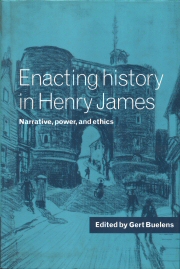Book contents
- Frontmatter
- Contents
- Notes on contributors
- Acknowledgments
- List of abbreviations
- Introduction
- 1 Power relations in the novels of James: the ‘liberal’ and the ‘radical’ version
- 2 Multiple germs, metaphorical systems, and moral fluctuation in The Ambassadors
- 3 James and the ethics of control: aspiring architects and their floating creatures
- 4 James and the shadow of the Roman Empire: manners and the consenting victim
- 5 ‘What Maisie knew’: Henry James's Bildungsroman of the artist as queer moralist
- 6 The double narrative of ‘The Beast in the Jungle’: ethical plot, ironical plot, and the play of power
- 7 Homoeroticism, identity, and agency in James's late tales
- 8 ‘A provision full of responsibilities’: senses of the past in Henry James's fourth phase
- 9 Possessing the American scene: race and vulgarity, seduction and judgment
- 10 History, narrative, and responsibility: speech acts in ‘The Aspern Papers’
- Index
4 - James and the shadow of the Roman Empire: manners and the consenting victim
Published online by Cambridge University Press: 02 February 2010
- Frontmatter
- Contents
- Notes on contributors
- Acknowledgments
- List of abbreviations
- Introduction
- 1 Power relations in the novels of James: the ‘liberal’ and the ‘radical’ version
- 2 Multiple germs, metaphorical systems, and moral fluctuation in The Ambassadors
- 3 James and the ethics of control: aspiring architects and their floating creatures
- 4 James and the shadow of the Roman Empire: manners and the consenting victim
- 5 ‘What Maisie knew’: Henry James's Bildungsroman of the artist as queer moralist
- 6 The double narrative of ‘The Beast in the Jungle’: ethical plot, ironical plot, and the play of power
- 7 Homoeroticism, identity, and agency in James's late tales
- 8 ‘A provision full of responsibilities’: senses of the past in Henry James's fourth phase
- 9 Possessing the American scene: race and vulgarity, seduction and judgment
- 10 History, narrative, and responsibility: speech acts in ‘The Aspern Papers’
- Index
Summary
Rome has served, for the West, as its greatest sign of historical necessity. Look, touch believe: this truth seems engraved in the very stones of Rome, that history is not just what has been, but what always had to be. How comforting to contemplate the pastness of the past, to feel one's exemption from it, as Isabel Archer does, initially, as she takes the long stride from the Roman past to her own future in a single flight (PL, ch. 27). Or alternatively, for James himself, closer to home, how numbing to feel the estrangement, face to face with the grave of his sister Alice, the pen dropping helplessly from his hand, ‘with what it meets of the ineffable, what it meets of the cold Medusa-face of life, of all the life lived, on every side’ (CN, 240). James was acutely attentive to the actions of memory and forgetting, and the powers that drive them on, in public and in private. The modern city could seem to him ruthlessly devoted to the very principle of forgetting. On the steps of the Capitol in Washington, an encounter with a trio of Indian braves wandering peaceably through the august precincts inspired him to imagine the very action of ‘history’ itself as a foreshortening and simplification, ‘reducing to a single smooth stride the bloody footsteps of time’: ‘One rubbed one's eyes, but there, at its highest polish, shining in the beautiful day, was the brazen face of history, and there, all about one, immaculate, the printless pavements of the State’ (American Scene, ch. II).
- Type
- Chapter
- Information
- Enacting History in Henry JamesNarrative, Power, and Ethics, pp. 75 - 92Publisher: Cambridge University PressPrint publication year: 1997



